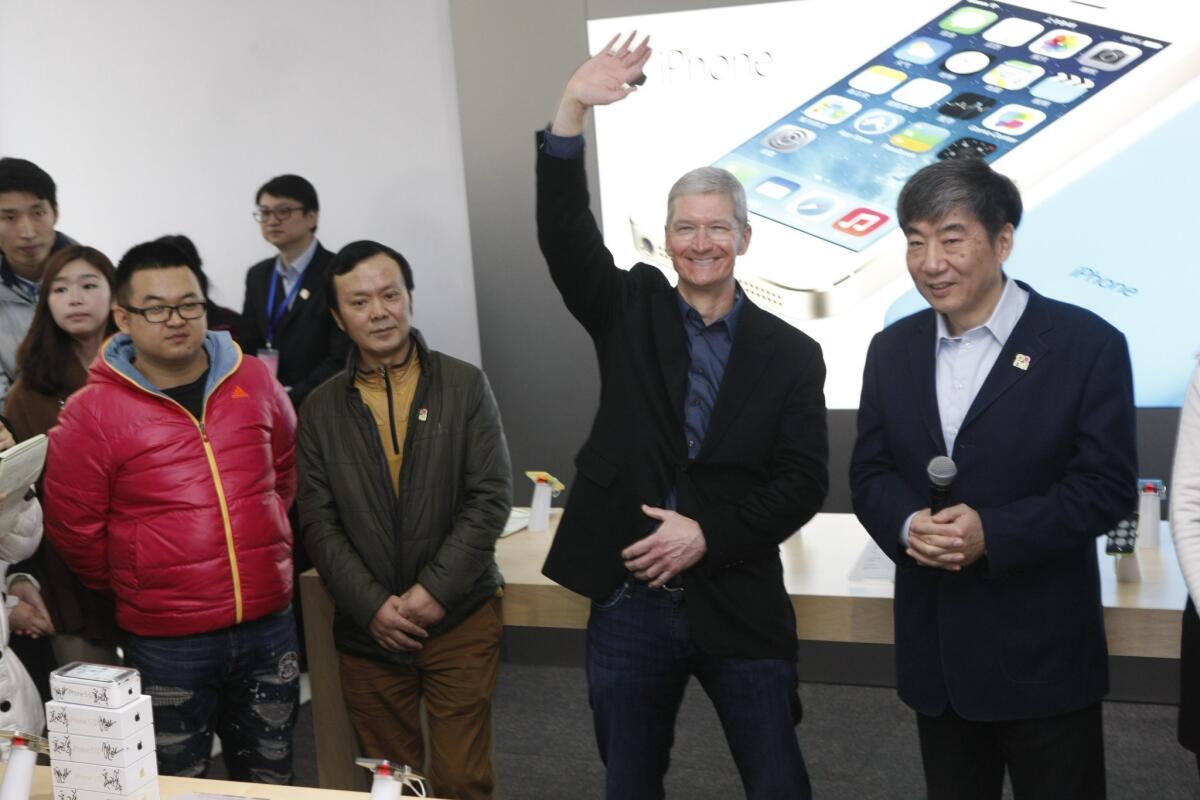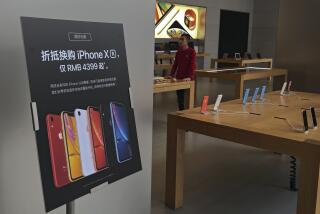Analysis: With iWatch and new iPhones, Apple CEO Tim Cook faces defining moment

Three years into his tenure running one of the world’s most important companies, Tim Cook is on the eve of a defining moment.
On Tuesday, if numerous reports are correct, Apple will unveil its long-awaited smartwatch, along with two bigger versions of the iPhone. Also expected are a mobile payment service and greater integration of health and fitness services unveiled earlier this year at the company’s developers’ conference.
Apple manages to make every product announcement feel epic, even when the advances or upgrades are trivial. But this time, there’s clearly more at stake.
Brian White, an analyst at Cantor Fitzgerald, called it “the most widely anticipated new product unveiling in the tech world this year.” And even that may be an understatement.
Apple seems to be acknowledging these expectations by holding the announcement in the larger Flint Center in Cupertino, rather than the usual town hall on its campus, and making the event available to the world via a livestream. It wants as many people as possible to get a look at what’s coming.
Naturally, the iPhones will attract a huge amount of attention. They continue to account for the lion’s share of Apple’s revenues and profits. But making bigger iPhones seems like an obvious move, particularly given the interest in larger screen sizes in markets like China.
It’s the other announcements, the smartwatch and mobile services, that ultimately promise to give us the greatest insight into Cook’s leadership and Apple’s future.
These types of products and services are typical Apple. They are not wholly original ideas. Companies have been making smartwatches for years. And there’s a gaggle of companies that have been trying to ignite mobile payments and health-related digital services. But so far, none have really taken off in a big way.
The same was true of digital music players, digital music downloads, smartphones and tablets before Apple came along with the iPod, iTunes, the iPhone and iPad.
While these products were the work of hundreds if not thousands of Apple employees, Apple founder Steve Jobs was credited with having the insight and discipline to keep saying no and sending things back for more work when it didn’t feel perfect. In a corporate world, where investors demand more profits and revenues every quarter, Jobs managed to stay true to his own sense of quality. He would not be rushed.
And that’s an element of Apple’s success that many observers miss, particularly those who are constantly lobbing criticisms that Cook and Apple have not introduced any new product categories in four years. As much as Apple gets the design and functionality right, it also consistently gets the timing right.
More than any other company, under Jobs, Apple had a keen sense for when both users and the technology were ripe for a particular new type of product.
Obviously, Cook believes that users are ready for a smartwatch and the technology has evolved enough to make for a spectacular experience. And he believes that we are ready to plunge ahead with mobile payments and to monitor our health and share that information online. (The recent iCloud celebrity hack scandal makes the timing of the payments and health products launches awkward.)
Are we ready? I’m not entirely convinced that the answer is yes. I’ve tried many smartwatches and never found anything particularly compelling about them. I’ve played with a few mobile payment services and never felt like they offered a greater convenience than just whipping out a credit card. And I’ve never taken the plunge to use any of the various health monitor gadgets.
Then again, when I first saw the iPad back in January 2010, I didn’t feel particularly moved by it. It was only when I eventually bought one that I suddenly couldn’t remember how I’d managed without it. Just like I did with my first iPhone and iPod.
Will I and others feel the same the first time we slip on the iWatch? Will the experience be so magical that our iPhones and iPads feel useless unless we have a companion strapped to our wrist? In a year, will I be sitting around wondering how I ever got by without an iWatch? Or making mobile payments? Or using Apple’s health services?
That is the type of magic that Apple has been consistently able to conjure. And beyond sales figures or market share, this is what users so badly want the company to deliver under Cook. They want to know that the company still retains the intuitive sense that allows it to nail the features, design and timing of new products. That it knows what we want before we know ourselves.
It’s subjective, and it will still take a couple years before we really know the verdict. As we await the iWatch, which reportedly may not go on sale for several months, it’s worth remembering that products like the iPhone and the iPod took awhile to ramp up sales. It was the iPad that bucked this trend by becoming a blockbuster right out of the gate.
Indeed, in a note to clients, Morgan Stanley analysts took a conservative view of the iWatch’s impact on Apple’s bottom line: “In our base case, we assume iWatch’s penetration of Apple’s user base follows iPhone’s initial penetration, which equates to $9B of iWatch revenue and $0.49 of EPS in the first 12 months. In our bull case, those numbers double as we assume iWatch’s penetration is similar to iPad’s initial rate.”
Either way, for a company that posted $170 billion in revenue it its 2013 fiscal year, these are not game changing numbers.
So we’ll have to resist passing instant judgments on Cook and the iWatch, even though many will do just that. But ultimately, the unveiling on Tuesday will reveal whether Apple can still be the company that its fans and customers want it so badly to be.
Follow me on Twitter @obrien.







